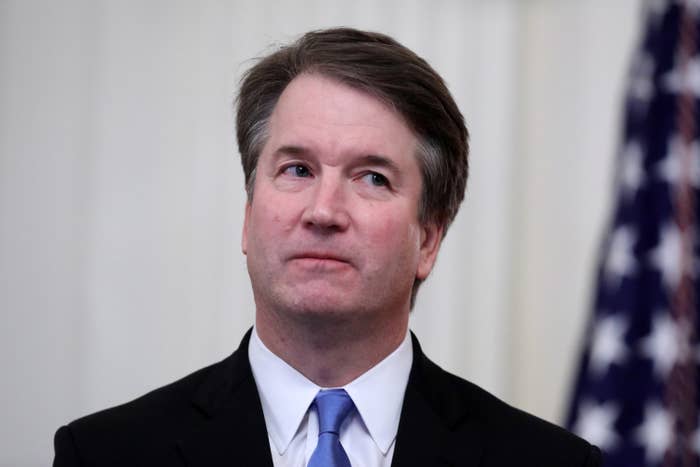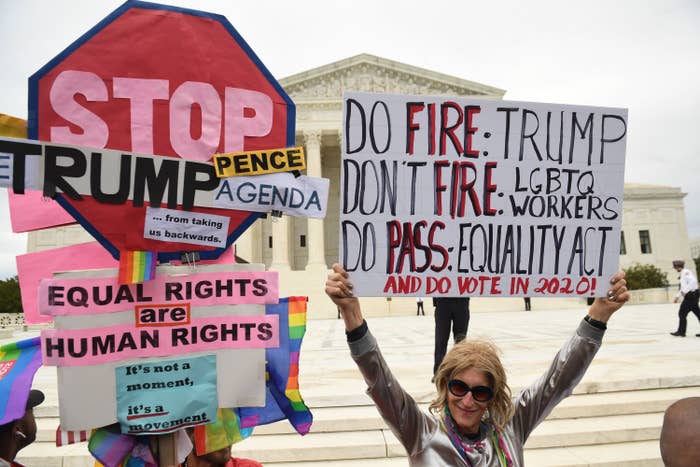
WASHINGTON — In the first major LGBTQ rights case to reach the US Supreme Court since he became a justice last year, Justice Brett Kavanaugh gave little away during arguments on Tuesday, asking only one question.
The court heard two cases about whether a federal law prohibiting “sex”-based discrimination in the workplace protects people from being fired simply because of their sexual orientation or gender identity — the case turns on whether the justices conclude those are rooted in a person’s “sex.”
Kavanaugh replaced Anthony Kennedy, who by the time he retired in 2018 had become not only the court’s swing vote, but also a leading proponent for the rights of LGBTQ individuals; Kennedy wrote the opinion that legalized same-sex marriage. Civil rights advocates feared that Kavanaugh, as Trump’s second Supreme Court appointee, would move the court further to the right on a number of issues, including LGBTQ rights.
But Kavanaugh gave no real clues about what he’s thinking during arguments on Tuesday. The court heard two sets of cases — first, whether Title VII of the Civil Rights Act of 1964, which protects workers against discrimination from private employers based on “sex,” protects workers based on their sexual orientation, and second, whether the law protects workers who are transgender.
Kavanaugh’s lone question was directed at Jeffrey Harris, who argued on behalf of employers in the sexual orientation cases. Kavanaugh asked if Harris was drawing a distinction between the “literal” and “ordinary” meaning of “because of sex” in the context of sex-based discrimination. Harris said he was not, and then moved on to another point. Kavanaugh didn’t follow up or elaborate on why he’d asked the question.
In both cases, the employers, with support from the Trump administration, argued that interpreting Title VII’s prohibition against discrimination based on “sex” to include discrimination against LGBTQ workers would be going beyond what Congress had intended. When Congress passed Title VII in 1964, the term “sex” was meant to refer to a person’s biological sex, they said, and courts had overstepped by finding it also covered sexual orientation and transgender status.
The Obama administration had taken the position in 2014 that Title VII’s ban on sex discrimination applied to transgender workers in cases involving employees fired because of their gender identity, but in October 2017, then–attorney general Jeff Sessions issued a new memorandum reversing that.
On Tuesday, Chief Justice John Roberts Jr. and Justices Samuel Alito and Neil Gorsuch explored arguments raised by lawyers for the employers and the Justice Department that the court would be usurping the powers of Congress and the democratic process by stepping in. US Solicitor General Noel Francisco argued that when Congress and state legislatures expanded legal protections for LGBTQ individuals, they’d usually paired it with religious-based exceptions. A ruling for the employees in these cases wouldn’t account for those concerns, Francisco argued.
Lawyers for the employees countered that they weren't asking the court to redefine or expand the meaning of "sex" under Title VII — that by firing employees for being gay or transgender, employers were treating them differently because of their sex as compared to the sex of people they were attracted to, or a decision to change their sex from what they were identified as at birth.
Meanwhile, justices on the court’s more liberal side asked several questions focused on the historical role of courts in protecting the rights of Americans against discrimination not only because of their sex, but also race and religion, and how the courts had evolved beyond what Congress may have intended when it adopted certain laws decades ago. Justice Ruth Bader Ginsburg noted, for instance, that no one thought that Title VII applied to sexual harassment in the workplace until the court ruled that it did.

Justice Sonia Sotomayor asked Francisco at what point a court should continue to permit discrimination against certain groups. Gay people were still being beaten and ostracized, she said.
“We can’t deny that homosexuals are being fired merely for who they are,” Sotomayor said. “At what point do we have to say, we have to step in?”
Several justices also spent time exploring what a ruling in these cases would mean for situations where a person wanted to use a bathroom designated for a gender different from what they were identified as at birth — for instance, a transgender woman who wished to use a women's restroom — even as lawyers for the employees insisted that these cases were not about the bathroom issue and that a ruling either way wouldn't resolve it.
Pressed by Justice Sonia Sotomayor to say how courts should consider the bathroom question, ACLU national legal director David Cole, who argued on behalf of transgender workers, replied that it was not the core question at issue now, but that imposing a bathroom policy that forced a person to use a bathroom opposite from their gender identity would "impose a discriminatory injury."
Defining “sex”
The first set of cases the court heard Tuesday involved gay men, Donald Zarda and Gerald Lynn Bostock, who sued after they were fired because of their sexual orientation. In Zarda’s case, the 2nd Circuit issued an opinion in February 2018 finding that “sex” discrimination under Title VII covered sexual orientation discrimination. In Bostock’s case, the 11th Circuit went the other way, ruling that it was bound by earlier cases in that circuit that said being fired for being gay was not barred under Title VII.
Lawyers for Zarda and Bostock argued that discriminating against a worker for their sexual orientation was discrimination based on “sex” because it was rooted in gender-based issues — the gender of the worker as compared to the gender of people they were in relationships with. They also argued that sexual orientation discrimination involved stereotyping based on sex, which was barred under Title VII.
On Tuesday, attorney Pamela Karlan argued that the 1964 civil rights law was adopted during the "days of Mad Men," and that courts had since found that the workplace protections applied to a number of scenarios that Congress hadn't envisioned at the time, including sexual harassment. When Alito asked about what Congress understood "sex" to mean in 1964, and suggested the employees were trying to change that meaning, Karlan pushed back. She said it was about gender expectations — that if a male and a female employee liked to sew, for instance, and the male employee was fired for that, that was discrimination under the law.
The employers in these cases, backed by the Justice Department as an amicus, or “friend of the court,” argued that “sex”-based discrimination had to involve a member of one sex being treated worse than another. Comparing the treatment of a gay man with the treatment of a heterosexual man in the workplace was the wrong way to look at it, the Justice Department and lawyers for the employers argued — it was about whether men and women in same-sex relationships were being treated the same.
Gorsuch asked Harris about the fact that Title VII didn't say that sex had to be the only, or even primary, reason for discrimination to trigger the law's protections. If an employee's "sex" was part of the reason for being treated differently, along with their sexual orientation, "isn't that enough?" Gorsuch asked. Harris replied that if they removed any reference to the gender of the gay men who sued, the claims would still make sense, but if they removed references to sexual orientation, the claims would not make sense — that showed that the cases were about sexual orientation, and not the gender of the employees involved.
Later on, Gorsuch posed a similar question to Francisco, saying it appeared that sex was "at least one contributing cause" in the cases of the two gay men who were fired. Francisco disagreed, arguing that as long as gay men and lesbian women were treated the same, there was no discrimination based on "sex."
The legal fight over legal protections for transgender workers centers on Aimee Stephens, a transgender woman who was fired from her job as a funeral director at R.G. & G.R. Harris Funeral Homes after telling the owner she would be transitioning. Stephens filed a complaint with the Equal Employment Opportunity Commission, which concluded that she was the victim of unlawful sex discrimination under Title VII.
The funeral home owner, who is Christian, argued that firing Stephens didn’t violate Title VII, and that being forced to keep Stephens on the job violated his religious beliefs. The funeral home argued it didn’t discriminate based on “sex” because it required all employees to follow the dress code based on biological sex. The company also objected more broadly to the principle that Title VII made it unlawful to fire someone based on their transgender status.
In March 2018, the US Court of Appeals for the 6th Circuit ruled in favor of Stephens, and concluded that Title VII’s prohibition against sex discrimination in the workplace applied to transgender individuals. If an employer fired an employee for transitioning, that was a decision rooted in the employee's “sex,” the court held. The court also ruled that Title VII’s worker protections overcame any burden to the funeral home owner’s religious beliefs.
Stephens’ lawyers argued that even if “sex” only referred to the gender assigned to a person at birth, the funeral home’s treatment of Stephens still violated the law because she was being treated differently for being assigned a male sex at birth. They also argued that the funeral home had relied on sex-based stereotypes — preconceived ideas about how men and women should look and act — in its treatment of Stephens, which also violated Title VII.
Alito asked if a ruling in favor of Stephens on the Title VII issue would mean that barring a transgender woman from participating in women's sports would violate Title IX, the federal law that prohibits sex-based discrimination in educational programs or activities, including sports, that receive federal funding. Cole replied that, like the bathroom issue, that question wouldn't be decided regardless of how the court ruled on Title VII. There can be sex segregation in sports under Title IX and there could be questions about how Title IX applies in cases involving transgender individuals, Cole said. But, again trying to steer arguments back to Title VII, Cole said those issues were unrelated to whether firing someone because their gender identity didn't match their biological sex at birth was sex-based discrimination.
Gorsuch asked Cole about concerns that courts should take into consideration the "massive social upheaval" that could come with a ruling in a case like this and exercise "judicial modesty." Cole pointed to a 1989 decision from the Supreme Court, Price Waterhouse v. Hopkins, where the court ruled that a woman who claimed she was penalized at work for being too aggressive could sue under Title VII. How could courts interpret Title VII to say the woman in the 1989 case couldn't be fired for being "insufficiently feminine" while Stephens could be fired for being "insufficiently masculine"? Cole argued.

